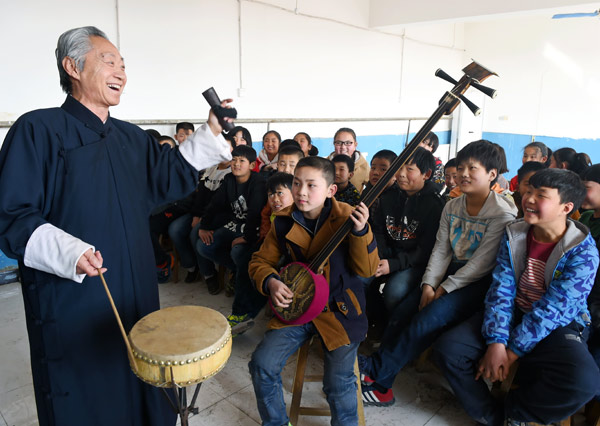 |
|
The inheritor of Cangzhou big plank drum Wang Yinjie performed for school students in Hebei province on March 17, 2016. [Photo/Xinhua] |
At the Ministry’s first quarter press briefing, inspector of the Department of Intangible Cultural Heritage, Ministry of Culture, Ma Shengde said, “From 2016, subsidies to 1,986 national inheritors of intangible cultural heritages will rise to 20,000 yuan ($3088). They will use the allowance on the cultural heritage promotion, rather than their living improvement.”
Ma noted that the subsidies increase will encourage inheritors and help them to deal with the difficult problems efficiently in promoting cultural heritage activities. It can also lead the public to pay more attention to the safeguarding of inheritors and their skills.
The central government started to assist inheritors by giving subsidies of 8,000 yuan ($1,235) per year for each one in 2008. In 2011, the allowance rose to 10,000 yuan ($1,544).
According to Ma, the central and local governments enhanced the management of the special funding to preserve intangible cultural heritages.
In 2015, the Ministry directly transfers the subsidies to the personal accounts of the national inheritors who belong to the units directly under the central government.
“Some places, such as Hunan and Henan province have adopted this method. The provincial department of finance or culture will give the subsidies to the inheritors directly,” said Ma.
“This will avoid the long process, complicated steps and unreasonable deduction during the fund transfer. Meanwhile, we have adopted various measures to strengthen the supervision on the performance of those inheritors who have received the subsidies. For example, in some provinces, annual work reports, work plans and periodically evaluations on inheritors’ performance are required to encourage inheritors to fulfill their duty of promoting intangible cultural heritage,” noted Ma.
To ensure the most effective use of the subsidies, Ma added the Ministry will go on supervising the fund in light of requirements to the State Council and the central government.
Ma said, “We will try to increase the subsidies when the condition allows us to. We hope the local governments also provide more support and help the inheritors in their cultural heritage promotion activities.”
According to official figures, 295 out of 1,986 inheritors of national-level intangible cultural heritage have passed away and half of those living are above the age of 70. To prevent the practices from being forgotten, the Ministry of Culture in 2015 started to collect detailed records of the practices and their leading inheritors. In 2016, the skills of 300 inheritors will be recorded.
According to Ma, the ministry also launched a training plan in 2015. Some universities, colleges and institutions with research ability on intangible cultural heritage are entrusted to carry out the plan. In 2016, more than 10,000 inheritors, apprentices and common staff in the field will be covered in the plan.